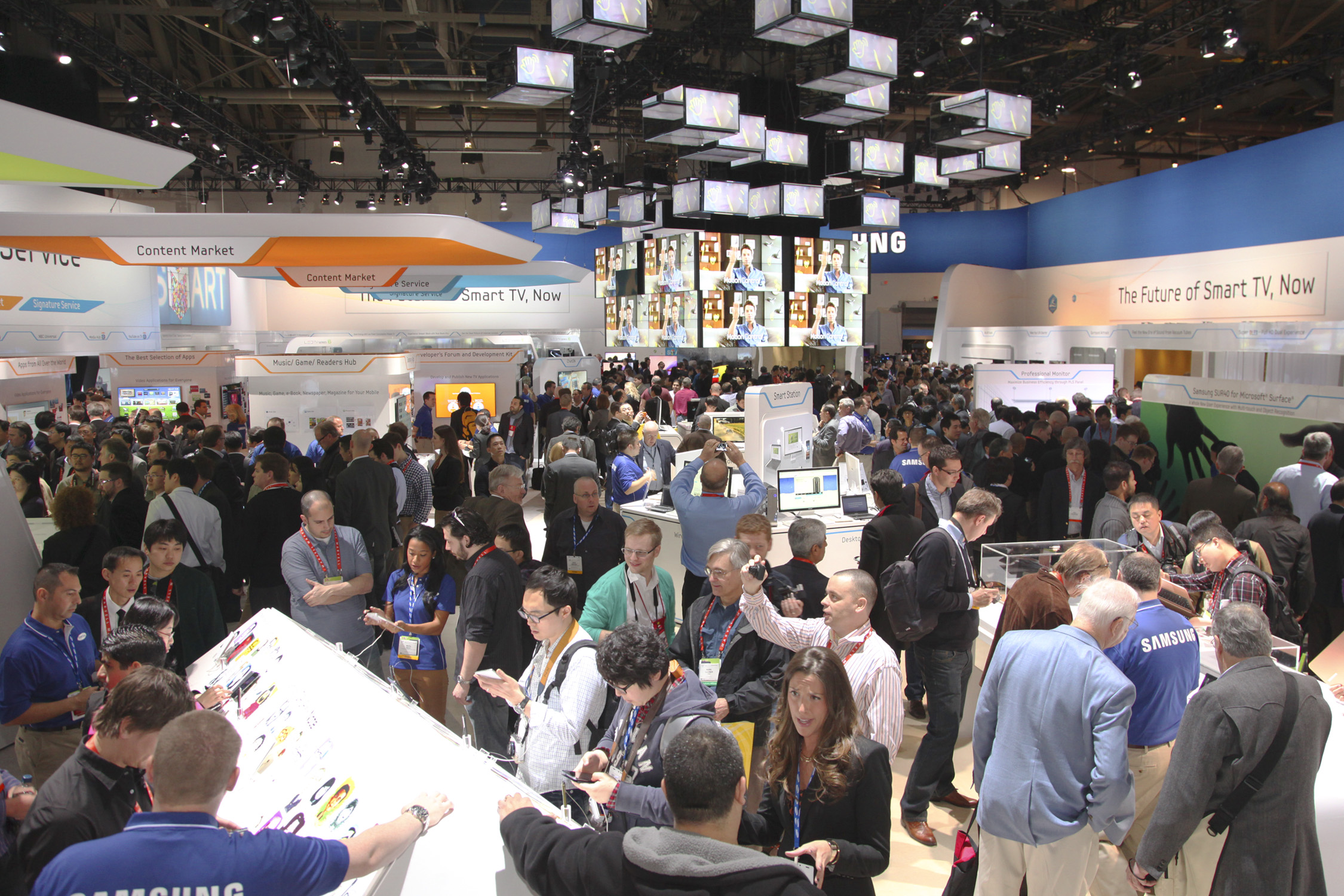Some Tech critics are like eunuchs in a harem. They see it done, they see how it should be done, but they can’t do it themselves or derive any pleasure from it, so they conclude that it’s a waste of time and effort. ((Inspired by: “Critics are like eunuchs in a harem. They’re there every night, they see it done every night, they see how it should be done every night, but they can’t do it themselves. Brendan Behan, quoted in M. Sullivan, Brendan Behan: A Life (1997)”))
The Premise
Christopher Mims, writing for Quartz:
2013 was a lost year for tech
All in, 2013 was an embarrassment for the entire tech industry
[pullquote]Oh, look! A dead horse! Where’s my stick?[/pullquote]
Mim’s article has already been critiqued, in detail, by the likes of John Gruber, Apple 2.0, and Daniel Eran Dilger. But never let it be said that I’m above piling on. To paraphrase Dorothy Parker: “This is not an article to be tossed aside lightly. Rather, it should be thrown with great force.”
For that reason, I present to you (some of) what’s wrong with Christopher Mims’ critique of tech in 2013.
Commodities
2013 was the year smartphones became commodities…
Prices for good tablets have similarly collapsed.
What Mims claims is fine and all except for one thing — it just ain’t true.
A commodity is a class of goods for which there is demand, but which is supplied without qualitative differentiation across a market. A commodity has full or partial fungibility; that is, the market treats its instances as equivalent or nearly so with no regard to who produced them.
Phones and tablets are anything but commodities. I could prove that in some detail, but I don’t need to. One can tell that phones and tablets are not a commodity simply by looking at the wide disparity in their prices.
To miss something that obvious isn’t easy to do, but Mims — in this article, at least — seems to be up to the challenge.
LESSON #1: YOUR DEFINITIONS HAVE TO BE RIGHT
If you don’t know the proper definition of a term, don’t use that term to support your argument.
Creative Destruction
Mims cites all of the following as signs that ‘2013 Was a Lost Year for Tech’:
Microsoft lost nearly a billion dollars on the Surface RT tablet…
Microsoft CEO Steve Ballmer will be pushed out…
Microsoft bought Nokia‘s devices business….
The outlook wasn’t much better for Intel…
BlackBerry…proved to be a near-total loss.
(T)he best that can be said so far (of Hewlett-Packard) is that it’s gracefully managing its own decline.
[pullquote](E)very wrong attempt discarded is a step forward. ~ Thomas Edison[/pullquote]
In viewing the above, any student of economics would come to the exact opposite conclusion that Mims did. 2013 was not a lost year. Far from it. It was a year of turmoil and turnover — the very embodiment of creative destruction.
“Creative destruction is a process through which something new brings about the demise of whatever existed before it. The term is used in a variety of areas including economics, corporate governance, product development, technology and marketing. In product development, for example, creative destruction is roughly synonymous with disruptive technology.” ~ Wikipedia
LESSON #2: YOUR THEORY HAS TO BE RIGHT
If you don’t know the proper economic theory, don’t use it to support your argument.
Planned Obsolescence
(Apple) crippled many older iPhones and led to complaints of planned obsolescence.
John Gruber refutes this argument, in detail, here.
[pullquote]People everywhere confuse what they read … with news. ~ A. J. Liebli[/pullquote]
Mims’ naked assertion that iOS7 crippled older iPhones is particularly grating. If you’re going to build an argument, you have to build it on a firm foundation. And if you’re going to make an extraordinary claim, then you have to provide extraordinary proof to support it. Instead, people like Mims simply make spurious claims and then build elaborate arguments on top of virtually nothing. It’s the equivalent of building a skyscraper on quicksand.
LESSON #3: YOUR FACTS HAVE TO BE RIGHT
If you can’t support your facts, don’t use them to support your arguments.
Making Us Sick
(Apple introduced) animate(d) 3D effects that make some users feel ill…
Really?
Seriously?
[pullquote]Little things affect little minds. ~ Disraeli[/pullquote]
This is one of the buttresses Mims uses to support his contention that 2013 was a lost year in tech? Would he have similarly claimed that the Model-T, and every car that succeeded it, was a failure because it made some people car sick?
This is a textbook display of the cognitive distortion known as all-or-nothing thinking:
“All-or-nothing thinking: seeing things in black or white as opposed to shades of gray; thinking in terms of false dilemmas. Involves using terms like “always”, “every” or “never” when this is neither true, nor equivalent to the truth.”
Yes, some very few users of iOS 7 did suffer from motion sickness. Yes, Apple immediately released an update to remove the offending motion, if desired. Talk about throwing out the baby with the bath water. Mims discards all that is good in iOS 7 because he detects one trivial, easily correctable, flaw.
If Mims believes that progress comes without problems — and that any problem, no matter how trivial, outweighs all of progresses’ benefits — then he’d better get used to disappointment. And he’d better stop writing about tech.
LESSON #4: YOU’VE GOT TO KEEP THINGS IN PERSPECTIVE
One should never make a mountain out of a molehill.
Lulls
If it’s in the nature of progress to move in leaps, there are necessarily lulls in between. …2013 was a great big dud for technology as a whole.
[pullquote] We always overestimate the change that will occur in the next two years and underestimate the change that will occur in the next ten. ~ Bill Gates[/pullquote]
Lull? Lull? Does Mim even know what a lull is?
Geez, get some perspective man. 2013 was anything but a “lull”. Rather, it was a rapid acceleration of some important trends — like a car accelerating from 30 mph to 60 mph. Technology moved so fast in 2013, it was like trying to read Playboy magazine with your wife turning the pages.
Millions upon millions of people who never before had access to cellular or WiFi data connected in 2013. Millions upon millions of people who never before owned a computer bought one in 2013. Millions upon millions of feature phones were converted into smartphones in 2013.
More smartphones – which is A COMPUTER THAT FITS IN YOUR POCKET – were sold in a single quarter of 2013 than PCs were sold all year.
Perhaps Mims’ world wasn’t rocked in 2013 — but the worlds of tens of millions of ordinary folk was, and the world, as a whole, was changed forever.
LESSON #5: PERSPECTIVE MATTERS
If you don’t know the difference between gliding and accelerating, then stop criticizing the racers and stay safely on the sidelines.
No Breakthrough Products
Not a single breakthrough product was unveiled…
Apple’s new iOS7 mobile operating system…felt “more like a Microsoft release”…
(A) faster processor in the iPhone 5S…
(A) fingerprint sensor that solved a problem that wasn’t exactly pressing.
[pullquote]What? No unicorns in 2013? All of 2013? Shame. ~ Horace Dediu (@asymco)[/pullquote]
Mim’s whining that there were no tech breakthroughs in 2013 comes off as childish, impatient, petulant. He’s the worst kind of critic — having accomplished nothing himself, he demands annual miracles from others.
But that’s not the worst of it. Mim’s true sin is that he exposes his embarrassing lack of competence for all to see.
The role of the critic is to learn more, know more, understand more about their chosen field and to expose the unseen and explain the misunderstood to his audience. Even more, excellent critiquing consists of seeing what everybody else has seen and noticing what nobody else has noticed.
Does Mims do that? On the contrary.
Big things start small. The gardner sees the giant oak tree in the smallest acorn. Mims, on the other hand, expects the oak tree to appear fully grown.
LESSON #6: The great thing in this world is not so much where you stand, as in what direction you are moving. ~ Oliver Wendell Holmes
Conclusion
[pullquote]You are not superior just because you see the world in an odious light. ~ Vicomte de Chateaubriand[/pullquote]
If one looks for the bad in tech, one will surely find it. But is that the proper goal of tech journalism?
It seems to me that our job is to illuminate the fog. And while some use the light to illuminate, others use it to obscure.
Some people seem to think that innovation means change. And some think that change means innovation. But innovation doesn’t just mean change, it means making things better. And if you measure 2013 by that standard, then 2013 wasn’t a lost year, it was a year of change and change for the better.
And that’s worth writing about.

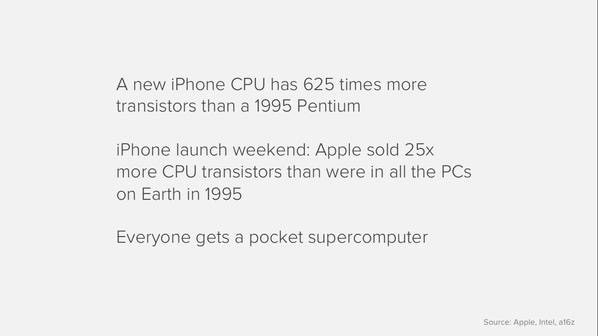


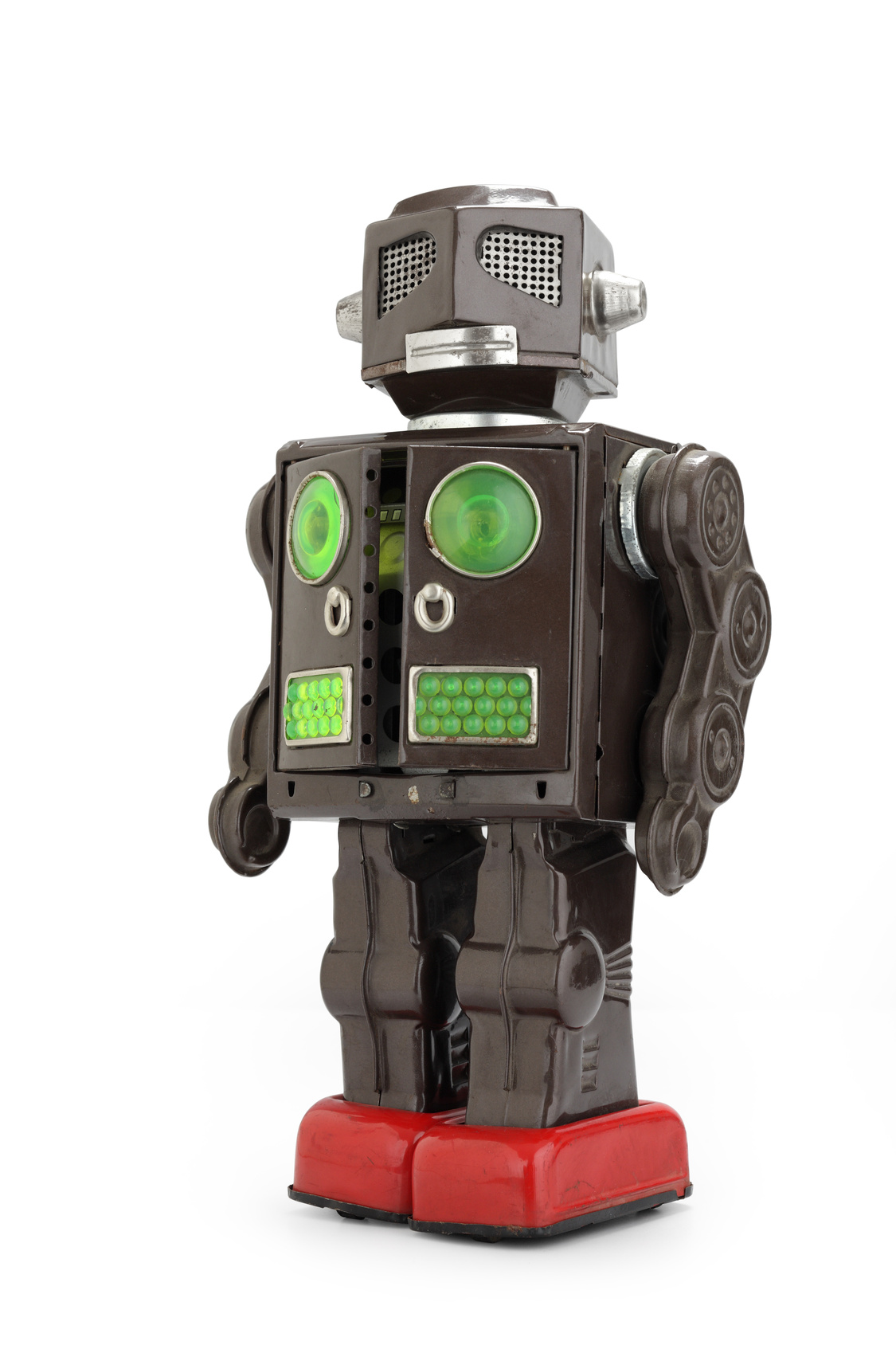
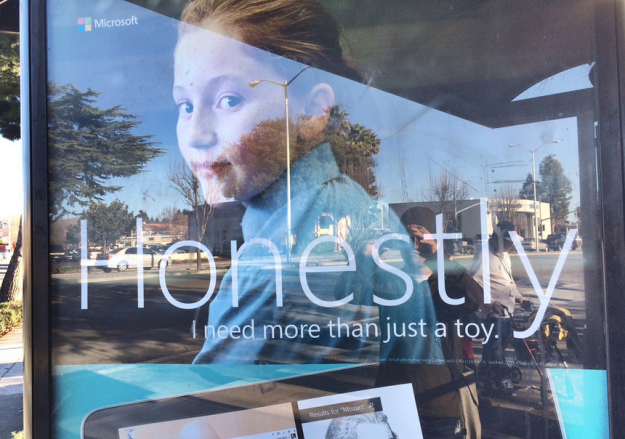
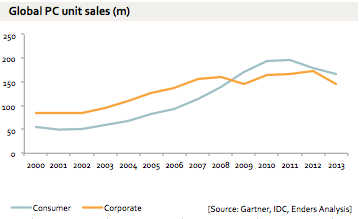 Benedict Evans poses — and then answers — the question: “How many people use PCs for ‘real work’?
Benedict Evans poses — and then answers — the question: “How many people use PCs for ‘real work’?


 It is the equivalent of concluding that if we do not understand the theory of relativity, that Einstein must have been a moron. Oh, pardon me — I mean, a ‘moran’.
It is the equivalent of concluding that if we do not understand the theory of relativity, that Einstein must have been a moron. Oh, pardon me — I mean, a ‘moran’.





